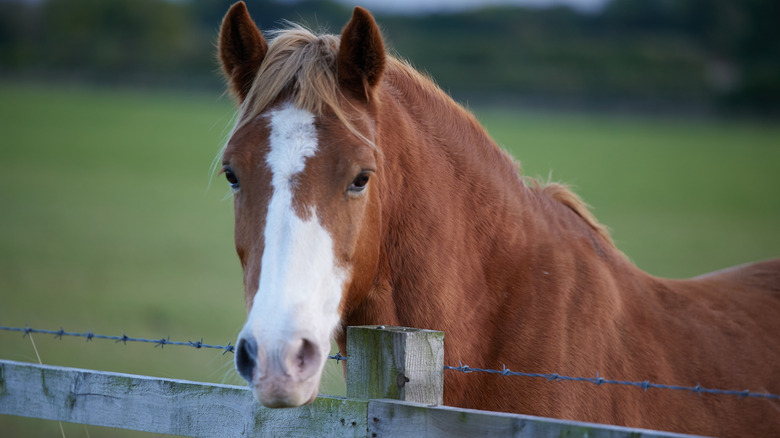Horse Meat Is Only Partially Banned In The US. Here's What That Means
Horses have been a part of human culture for thousands of years, having been domesticated roughly 6,000 years ago in modern-day Kazakhstan and Ukraine. As one of the world's most important livestock animals, they've been used for transportation, sport racing, farming, and as pack animals. And though it's likely distasteful to many Americans, horses have also historically for meat consumption.
In 2013, when a whole bunch of U.K.-based horse consumption stories broke. U.K. locations of Burger King and Tesco were caught selling burgers tainted with horse meat, some other guys sold horse meat as beef in the U.K., and Ikea was caught with horse meat in its famous meatballs.
But surely, any consumption of horse meat must be banned in the United States, right? Well, it turns out the answer is a little more complicated than that. The laws around horse consumption in the United States are a bit contradictory.
You can technically eat horse meat in the United States
Federally, horses can legally be slaughtered for food. But because they're classed as an "amenable species," horse meat can't be sold or shipped without inspection — and there is currently no legal process by which that inspection may take place. However, in the U.S., consuming horse meat is completely legal. If a horse dies of natural causes, or in any way that wasn't a direct result of attempted meat production, and you're right there, you can eat it.
Granted, most Americans still wouldn't chow down on Seabiscuit, as those in a position to eat a horse are likely the same people who considered it a beloved family pet. And even if that's not an obstacle, the cultural taboo is very real.
Lots of foods available internationally are banned in America, too. Some, such as casu marzu (Spanish maggot cheese) and shark fins, kind of make sense. Others, such as Kinder eggs, face bans for more surprising reasons (namely, "there's a toy in it, and kids might accidentally eat the toy"). Still, the taboo around horse meat hasn't stopped famous chefs who operate heavily in the U.S. from talking about how good it is, as Gordon Ramsay's list of tips and tricks for cooking horse meat shows. It's supposedly quite tasty, with a lean, sweet quality that makes it particularly good as a carpaccio or tartare.
Horses have traditionally been used for food in a lot of cultures
Eating horse meat isn't that unusual around the globe. It's most common in China, which leads the world in horse meat production and consumption, but the country is hardly alone. Horse is a common menu item in countries such as Mexico, Japan, Germany, Indonesia, Poland, and pretty much all of Central Asia (with Turkmenistan as a notable exception, as horses are considered religiously sacred).
For some regions, such as Central Asia, this is an ancient tradition. In others, it's newer. The consumption of four-legged animals was banned in Japan during the Edo period due to Buddhist edicts on red meat being "unclean," but horse consumption became popular in the country starting in the post-WWII 1960s.
Horses aren't the only animal eaten in other countries that would take Americans aback, either. Guinea pigs are pets in America, but they're commonly eaten in South America, especially Peru. Eating dogs is common in some parts of Asia. And to be fair, Western eating habits would be considered unacceptable in some countries, too. Beef is banned in many parts of India, for example, as cows are considered sacred in Hinduism. Cultural standards vary, and judging other countries for what animals they choose to eat is probably something to avoid.


